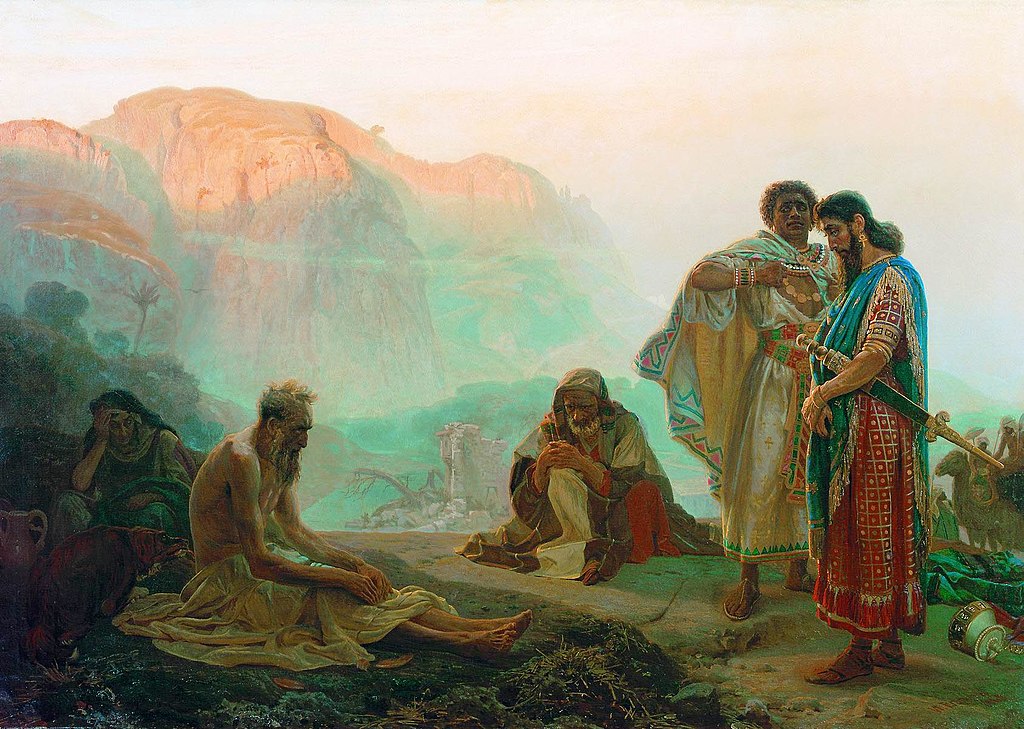In Sophocles’ Greek tragedy, Thebes is overcome by a plague. The oracle reveals that a murder and an incestuous relationship are the causes of the plague in the land. A man killed his father and married his mother.
![]()
King Oedipus is besides himself with righteous indignation. With the pomposity of an ignoramus, he pronounces judgement on the pervert that is responsible for the plague. After all as the Chief Judge of the nation, his office demands it. What is a king to do?
However, unbeknown to King Oedipus, life and chance gang up on him from birth. At his birth, his parents consult the oracle about the destiny of their child as is the custom of their day. The oracle says the child will kill his father and marry his mother. In a bid to avoid such a calamity, the child is given away to be executed. However, the executioner is overcome of mercy, takes the child to a distant land, never to know his parents.
Later in life the child now grown gets into a fight with a stranger whom he kills. The stranger is his father. Goes to a land which recently lost its king and solves their problem. A grateful people make him their king with the added benefit of inheriting the late king’s wife. The Queen, you guessed it, is his mother.
So who caused the plague? The oracle is unsparing in its revelation: YOU ARE THE ONE.
How often have we judged others out of a sense of self-righteousness over stuff for which we’re probably responsible?
The oracle’s brutal revelation finds resonance in scripture. A willy Prophet Nathan draws out King David in an emotive story of abuse of power. A rich man with plenty to keep and spare needs to entertain his guests. He leaves his bank of livestock untouched and seizes and kills his poor neighbour’s only ewe. The Prophet Nathan lures King David into a judicial hara-kiri. An apoplectic David issues his judgment. Nathan delivers the piece de résistance YOU ARE THE ONE.
How often have we judged others out of a sense of self-righteousness over stuff for which we’re probably responsible? It’s all so easy when we believe that our close communion with the Holy Spirit somehow shields us from all the challenges that humble flesh and blood. We’re in the world but not of the world. So if there’s something wrong with the world, it must be down to the shenanigans of the world, or in other word, sinners and unbelievers. AIDS, Tsunamis, Covid-19, name it, it must be ‘their’ fault. But art, scripture and history keep screaming YOU ARE THE ONE.
Things do get complicated when Trustees of the most sacred traditions violate the sanctity of those traditions. Worse when the society by virtue of its peculiar calling is Holy and professes a priestly vocation. As it is written:
“But ye are a chosen generation, a royal priesthood, an holy nation, a peculiar people; that ye should shew forth the praises of him who hath called you out of darkness into his marvellous light.”[1]1 Peter 2:9
St Paul took the weight of our privilege and responsibility to a cosmic level. He wrote that not only are we charged with judging the world, even angels will stand to ceremony at the thud of our magisterial gavel.[2]1 Corinthians 6:3 It’s a prospect many cherish. Does make the head spin, doesn’t it?
Our capacity to affect the world around us is powerful and pervasive.
In one sense St Paul is bang on the money. As people of covenant our impact on the cosmos is only barely understood. But our capacity to affect the world around us is powerful and pervasive.
Take for instance the story of the Prophet Jonah. Here was a man filled with the Spirit of God. His Prophetic ability was first celebrated in 2 Kings 14:25. He was one at whose mouth a nation waited on the word of God. He was chosen to be a light unto the nations.
However, in the first recorded encounter with gentiles, Prophet Jonah brought not light but darkness. God sent him to Nineveh on a mission of reconciliation. He was so offended that mercy would triumph over judgment that he rebelled. Much to the manner of the reaction of many Christians when one of our posts pleaded with God to have mercy on the whole world and put out the flame of hell. The suggestion that people who have not accepted Christ should be spared eternal fire offended many Christians. But scripture teaches that:
“And all things are of God, who hath reconciled us to himself by Jesus Christ, and hath given to us the ministry of reconciliation; To wit, that God was in Christ, reconciling the world unto himself, not imputing their trespasses unto them; and hath committed unto us the word of reconciliation.”[3]2 Corinthians 5:18-19
I digress.
Jonah in whom a merciful God ought to be reflected was filled with the spirit of malice and vengeance. His rebellion was to have a catastrophic effect on the Gentiles who had a singular misfortune of being in the same ship with him. In their efforts to survive the storm that Jonah’s rebellion brought upon them, they lost so much of their possession and business.[4]Jonah 1:3-5 YOU ARE THE ONE.
The closer one is to God, the more impact one’s choices have on the world in which one is a participant.
When those who do not know God transgress, the effect is not nearly as devastating as when those who have a priestly calling undermine the kernel of the covenant. In the eyes of God sinful Nineveh was a city of an ignorant people and therefore deserving of mercy.[5]Jonah 4:11 However, of Israel the Prophet Amos said:
“You only have I known of all the families of the earth: therefore I will punish you for all your iniquities.”[6]Amos 3:3
As with a nation so it is with individuals. The privilege of a covenant relationship with God carries with it great expectations and responsibility. Hophni and Phinehas, sons of Eli and priests of God did not reckon with the sacredness of their calling. They abused the privilege of their office, brought curses on their bloodline[7]1 Samuel 3:27-36 and a blanket of darkness over the whole nation.[8]1 Samuel 3:1 In fact, scripture called them sons of the devil [9]1 Samuel 2:12
The closer one is to God, the more impact one’s choices have on the world in which one is a participant. Whereas only Nabal died for his churlishness,[10]1 Samuel 25 David’s adulterous and murderous dalliance with Bathsheba unleashed an internecine bloodletting upon his family[11]2 Samuel12:7-9 and threw Israel into a civil war.[12]2 Samuel17
In fear Abraham dissembles. He lies about the truth of his relationship with Sarah. As a result Egypt suffers a plague[13]Genesis 12:10-20 and the household of Abimelech suffer barrenness![14]Genesis 20:1-16 The Church is yet to reckon with the damage we visit on the world on a daily basis.
If you want to make the world a better place take a look at yourself and make the change.
The key to a more peaceable and prosperous world is not necessarily lost in the lust of the flesh and the lust of the eyes and the pride of life of unbelievers. Believers, by virtue of our priestly calling have unrivalled capacity to impact the world for better or for worse. If we did away with the finger-pointing and bring the grace that hovers over us to bear upon the world, the world could be a better place. If the seed of our Lord Jesus Christ is in us then we have within us the power to take the sting out of the sins of the world,[15]Isaiah 53:5 rather than blaming all the ills of the world on those who don’t share our faith.
“If you want to make the world a better place take a look at yourself and make the change,” sang Michael Jackson. Start with the man in the mirror.


